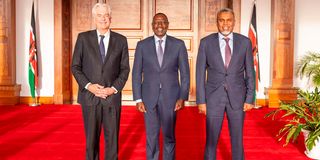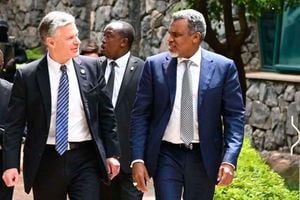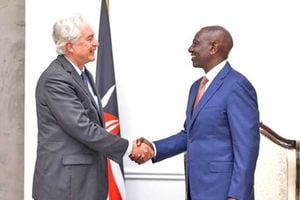
President William Ruto (centre), Central Intelligence Agency Director William J Burns (left), and National Intelligence Service Director Noordin Mohamed Haji pose for a photo after holding talks at State House in Nairobi.
Foreign intelligence chiefs have lately made it a habit to make whistle-stop visits to Kenya, highlighting Nairobi’s increasing role in global efforts to put out regional wars, strengthen counter-terrorism measures and curb organised crime including money laundering.
President William Ruto has hosted Central Intelligence Agency (CIA) Director William Burns twice this year, the latest on Monday, a week after Britain’s M16 chief Richard Moore also came calling. In June, days before the Gen Z anti-government protests that climaxed with the June 25 invasion of Parliament, Federal Bureau of Investigations (FBI) Director Christopher Wray visited Kenya for five days.
The visit to Nairobi by the CIA and MI6 chiefs came amid rising global concerns about terrorism financing particularly the activities of al-Shabaab in neighbouring Somalia as well as wars in Sudan and the Democratic Republic of the Congo (DRC).
Sources also say that, with the ongoing war in Gaza and growing conflict in the Middle East where Israel has taken on Iran and Lebanon’s Hezbollah, global powers have signalled an urgency to discuss counter-terrorism strategies with regional partners.
On March 11 this year, the US government imposed sanctions on al-Shabaab money launderers in the United Arab Emirates (UAE) and Eastern Africa, who were accused of abetting the group, whose operations net over $100 million (Sh13 billion) per year, particularly through extortion. Some Kenyans, including the owner of a bus company, were among over a dozen individuals and groups sanctioned by the US Department of the Treasury’s Office of Foreign Assets Control (OFAC).
The US imposed sanctions on “16 entities and individuals who compose an expansive business network spanning the Horn of Africa, the UAE, and Cyprus that raises and launders funds for al-Shabaab, a terrorist group affiliated with al-Qa’ida.”
“Individuals within this network include influential businesspeople in the region that lend financial backing to al-Shabaab, a terrorist group responsible for some of the worst terrorist attacks in East Africa’s modern history,” read a statement by the US government.
“The United States is committed to working with regional partners to root out terror financing networks and the entities they abuse to raise and move funds,” said Under Secretary of the Treasury for Terrorism and Financial Intelligence Brian Nelson at the time.
Read: How Covid billions stolen from US was spent in Nairobi's South C, Diani beach front properties
In Sudan, the violent power struggle between General Mohammad Fattah al-Burhan’s Sudanese Armed Forces (SAF) and General Mohamed Hamdan Dagalo’s (Hemedti’s) Rapid Support Forces (RSF) has drawn in foreign forces, including the Wagner Group—a private military company closely linked to the Russian government. Media reports have indicated that the Russian mercenary group has been supplying RSF with weapons to aid their fight against the country’s army.
Russia’s invasion of Ukraine has spawned a protracted war that has drawn in North Atlantic Treaty Organisation (Nato) powers led by the US, who are arming Ukrainian forces.
Kenya has positioned herself as a regional powerhouse and the deployment of its police officers to lead an international policing mission in troubled Haiti has also raised Nairobi’s profile. As a result, Nairobi has been designated by Washington as a non-Nato ally. This after President Ruto’s State visit in May to the US where he was hosted by President Joe Biden. According to insiders within the presidency and the security sector, the back-to-back visits by the CIA Director and MI6 chief point to Nairobi’s critical role as a partner in global peace and security.
The visit by the FBI director, who held meetings with security chiefs and toured the DusitD2 Hotel complex where al-Shabaab terrorists killed at least 21 people in 2019, also signalled Kenya’s star role in the war against terrorism in Africa.
During the visit, Mr Wray attended the first commander’s meeting of the Joint Terrorism Task Force in Kenya (JTTF-K), a multi-agency team established in 2020 following the DusitD2 attack and which is modelled after the FBI-led JTTF. It is the first of its kind established outside of the US. Mr Burns first visited in January and his second visit coincides with the looming termination of a peacekeeping mission in Somalia where Kenya Defence Forces (KDF) has played a key role in fighting al-Shabaab. Kenyan troops have also deployed under the East African Community Regional Force (EACRF), a multinational force that has been operating in Eastern DRC since November 2022.
Curb money laundering
The meetings with the spy chiefs, which have also been attended by National Security Intelligence Service (NSIS) Director Noordin Haji, have also focused on steps taken to curb money laundering, drug trafficking, external aggression, child and human trafficking, among other vices.
Following Monday’s visit by the CIA director, a source in the presidency said counter-terrorism and regional stability featured at the talks with President Ruto.
“The visit is normal. Kenya is a major partner. The discussions have centred on counter-terrorism, intelligence sharing, training, technology transfer and regional stability,” said an official within the presidency.
Another source revealed: “Kenya plays a key role in regional peace and security. Nairobi leads peace talks on South Sudan among other interventions.”
“Kenya is a trusted security partner of these countries. The talks emphasise a shared commitment to addressing extremism and securing East Africa's stability in shaping the regional policies,” said yet another source within the security sector.
He added: “Expect more visits as we foster our shared commitment to peace and prosperity.”
At the meeting, President Ruto underscored Kenya's considerable progress in mitigating the threats of radicalisation and organised crime through similar collaborations.











